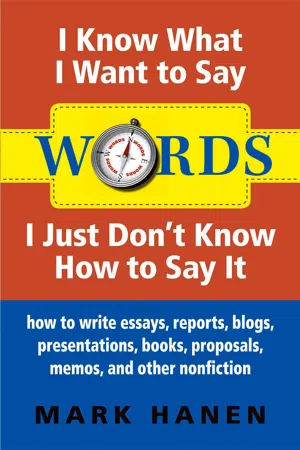
Words - I Know What I Want To Say - I Just Don't Know How To Say It
How To Write Essays, Reports, Blogs, Presentations, Books, Proposals, Memos, And Other Nonfiction
- 196 pages
- English
- ePUB (mobile friendly)
- Available on iOS & Android
Words - I Know What I Want To Say - I Just Don't Know How To Say It
How To Write Essays, Reports, Blogs, Presentations, Books, Proposals, Memos, And Other Nonfiction
About this book
Words skillfully guides you, step by step, through your entire writing project. Written in a conversational style, Words explains how to shape, focus, organize, and polish your nonfiction writing. It coaches you through the process of discovering what you want to say, how you want to say it, and how you convey your ideas with precision, clarity, and confidence.Words is for born writers, aspiring writers, and for people who have writing thrust upon them. If you are a student, Words provides a step by step approach to writing that works across disciplines and will serve you well throughout your academic and professional career. If you write books, proposals, essays, memos, reports, blogs, manuals, presentations, memoirs, articles, journals, speeches, or creative nonfiction, Words is the book for you.OverviewSection A, Knowing What You Want To Say, presents practical strategies for discovering your key word and your key idea, generating a title, and connecting with your audience. Thoughtful writing begins with a single word, a specific goal, and a well-defined audience.Section B, Knowing How To Say It, provides realistic techniques for writing your introduction, creating a shared context, conducting a guided tour of your ideas, and creating a satisfying ending. We all see the world through a slightly different lens because of our individual experiences and expectations. Writing is successful when readers see the world through your lens.Section C, Editing, offers common sense guidelines for editing your work and writing concise, confident, and credible sentences. It explains how the misuse of verbs is the leading cause of wordiness and how wordiness is the leading cause of poor writing. It also explains how the English language contains only four basic punctuation marks and three basic sentence types.Comments About The Book And The Author"No instructor has changed the course of my life more than Mark Hanen. His teaching style was a gift.... Words is chock-a-block full of many of the same crystal clear tips he taught in his classroom, and they are written in the same engaging style as when he presented them to his students. If readers take away even a smidgeon of his advice, they will be well on their way to becoming a better writer."Donna Kane's reviews, essays, poetry, and short fiction have been published widely as well as been aired on CBC and Garrison Keillor's Writer's Almanac. She is the award-winning author of two collections of poetry, and her writing appears in several anthologies."When I get positive comments from crown counsel or colleagues about my report writing I recall that many of the writing skills I possess are a direct result of the class I took with Mark. He was a teacher who truly enriched my education. He taught me to organize my thoughts and clearly articulate them in my writing."Beth Parslow is a Sex Crimes Investigator & Supervisor with the RCMP. With wisdom, clarity, and humour, Mark Hanen offers a common sense guide abou
Frequently asked questions
- Essential is ideal for learners and professionals who enjoy exploring a wide range of subjects. Access the Essential Library with 800,000+ trusted titles and best-sellers across business, personal growth, and the humanities. Includes unlimited reading time and Standard Read Aloud voice.
- Complete: Perfect for advanced learners and researchers needing full, unrestricted access. Unlock 1.4M+ books across hundreds of subjects, including academic and specialized titles. The Complete Plan also includes advanced features like Premium Read Aloud and Research Assistant.
Please note we cannot support devices running on iOS 13 and Android 7 or earlier. Learn more about using the app.
Information
ONE - Discover Your Keyword
– William Blake
Table of contents
- Table of Contents
- Introduction
- Before You Write
- ONE - Discover Your Keyword
- 1. Make A Keyword List
- 2. Consider Quotations
- TWO - Determine Your Key Idea
- A. Identify Your Overall Goal
- Chapter Two Summary
- THREE - Understand Your Audience
- 1. Make The Audience Real
- 2. Acknowledge Their Point Of View
- 3. Speak Their Language
- Chapter Three Summary
- As You Write
- FOUR - The Introduction - Establish A Shared Context
- A. Start With A Descriptive Title
- B. Consider An Epigraph
- C. Set The Stage
- Chapter Four Summary
- FIVE - The Middle - Conduct A Guided Tour
- 2. Use Transitional Devices
- 3. Provide Evidence
- 4. Document Your Sources
- Chapter Five Summary
- SIX - The Conclusion - Create A Satisfying Ending
- Chapter Six Summary
- After You Write
- SEVEN - Write Concise, Confident, And Credible Sentences
- 1. Avoid To Verbs